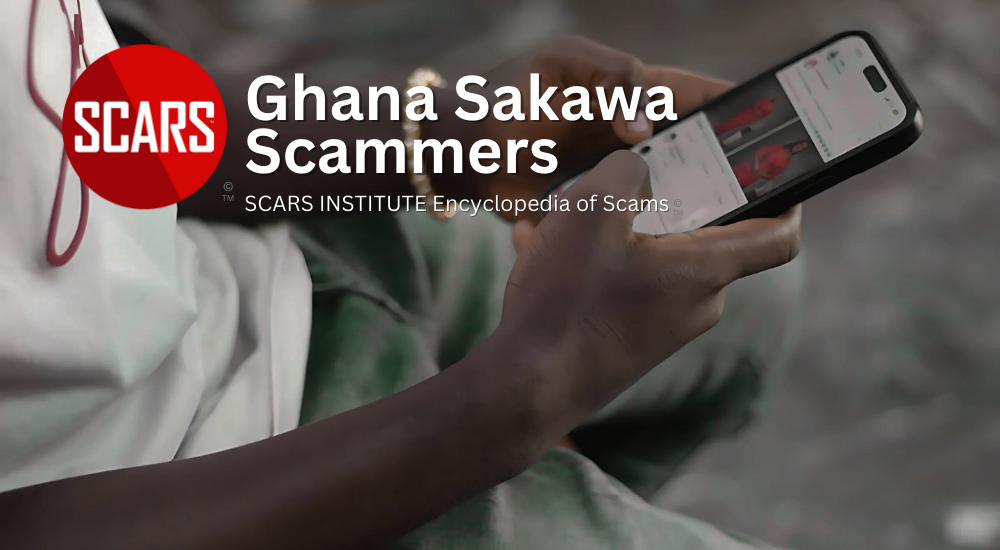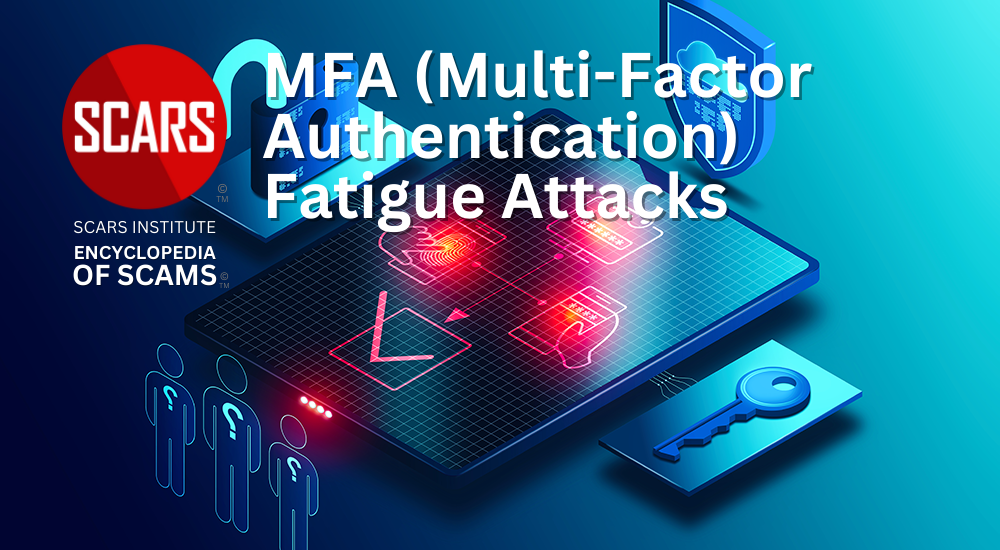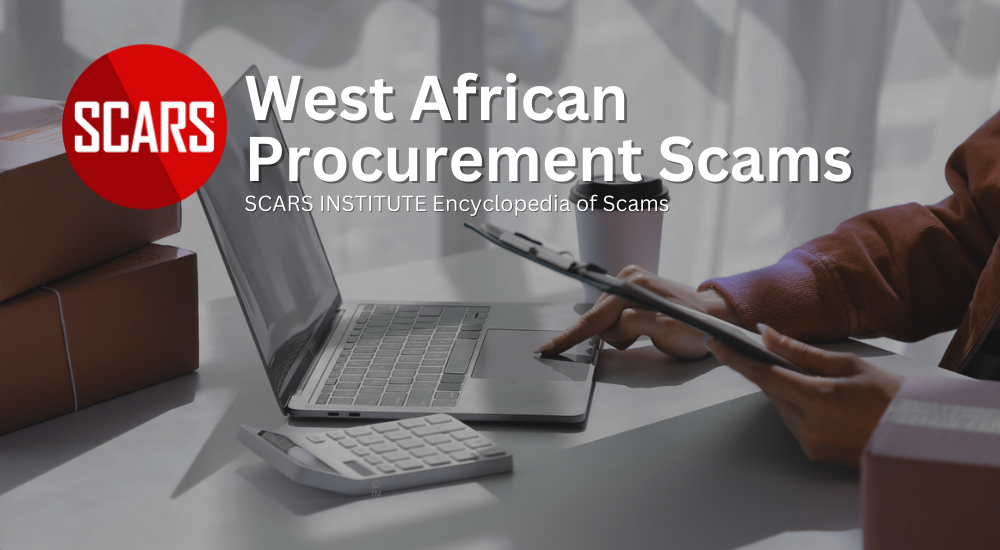
SCARS Institute’s Encyclopedia of Scams™ Published Continuously for 25 Years

Procurement Scams are Big Business
Procurement Scams in Ghana Nigeria and West Africa: A Rising Threat
How Scams Work – A SCARS Institute Insight
Author:
• SCARS Institute Encyclopedia of Scams Editorial Team – Society of Citizens Against Relationship Scams Inc.
Article Abstract
Procurement scams in Ghana and other West African countries involve fraudsters posing as government officials or company representatives, luring victims with fake procurement deals.
These scams often include requests for upfront fees, such as registration or processing costs, with the promise of lucrative contracts. Fraudsters use fake websites, documents, and high-pressure tactics to convince businesses of the legitimacy of the deals. Greed and sophisticated schemes fuel the persistence of these scams.
Businesses can protect themselves by conducting thorough due diligence and being cautious of unsolicited offers.

Procurement Scams in Ghana Nigeria and West Africa: A Rising Threat
Procurement scams are a growing problem in Ghana and other West African countries, where fraudsters target international businesses and individuals through sophisticated schemes. These scams often involve advanced fee fraud, where victims are lured into fake procurement deals with the promise of lucrative contracts. Scammers, posing as government officials or company representatives, use fake websites, forged documents, and high-pressure tactics to extract upfront payments, such as registration or processing fees. Victims are drawn in with promises of large-scale orders or partnerships, only to discover later that the entire operation is a ruse.
How Procurement Scams Operate
The typical procurement scam begins with unsolicited offers to foreign companies, often via email or fake online platforms. Scammers impersonate official representatives from government bodies or private businesses, presenting detailed proposals to buy goods or services. These proposals appear legitimate, sometimes even featuring official-looking documents and communications from supposedly high-ranking officials. The scammers insist on urgency, creating a sense of pressure to respond quickly.
Once the victim shows interest, the scammers escalate the scheme by requesting upfront fees for processing, registration, or various legal requirements. These payments, often described as necessary to facilitate the deal, are repeatedly requested under different pretexts, leading the victim down a path of continuous financial loss. In some cases, victims are even invited to travel to Ghana or neighboring countries to finalize the deal, only to face more demands or abandon the arrangement after realizing they have been scammed.
Common Red Flags
Businesses engaging with potential partners in West Africa should be aware of certain red flags that often accompany procurement scams:
- Unsolicited offers for large-scale contracts or government tenders, especially when there’s urgency or pressure to respond.
- Requests for advance fees, such as registration, legal, or banking fees, with promises of future lucrative payouts.
- Communications that rely heavily on email or fax, with little to no physical verification of the business’s existence.
- Fake documents with official-looking seals or signatures that are not easily verifiable.
- Frequent requests for blank letterheads or sensitive banking information.
- Claims of confidentiality or the involvement of high-level government officials to justify secrecy or the need for advance payments.
The Rise of Fake Entities
Many scammers create elaborate fake organizations and websites to lend credibility to their schemes. In Ghana and the surrounding region, fraudsters frequently impersonate organizations with names resembling legitimate government bodies or international development agencies. Entities like the “National Project Implementation Commission” or “West Africa Projects and Development Board” often have elaborate websites with detailed but completely fabricated information to deceive victims into believing they are part of legitimate business opportunities.
Why Procurement Scams Persist
The persistence of procurement scams is driven by economic hardship in West Africa, where some individuals turn to fraud as a form of financial survival. Scammers rationalize their actions as a necessary hustle in regions with limited job opportunities and high unemployment. The sophisticated nature of these scams—complete with official-looking documents and professional communication—makes them difficult to detect, allowing scammers to continue deceiving businesses and individuals globally.
Preventing Procurement Fraud
To protect against procurement scams in West Africa, it is critical for businesses to:
- Conduct thorough due diligence on any potential partner, using trusted verification services.
- Be cautious of unsolicited offers and requests for advance payments.
- Cross-check company information with official government or industry databases.
- Seek legal or commercial advice before agreeing to any upfront payments.
- Avoid sharing sensitive information, such as banking details or blank letterheads, without proper verification.
According to the International Trade Association
Ghana Scam and Fraud Alert
**Be extremely cautious of any business transaction that requires you to pay advance monies or fees (taxes, registration, procurement fees, bank fees, attorney fees, etc.). If you have already lost funds or feel you may currently be involved in a scam, please contact your local Secret Service field office and file a complaint with the FBI’s Internet Crime Complaint Center (IC3).
Background
U.S. individuals and businesses periodically are lured into scams and fraud schemes originating – or just purporting to be — in Ghana or the surrounding region. Cyber-crime takes many forms and can be perpetrated from anywhere; the individuals with whom you are communicating may not be located in the country they identify. You also should not automatically trust official-looking government documents you may have received from them. Fraudsters will go to great lengths to make you believe you are engaging in a legitimate business and/or procurement transaction. Do your due diligence before sending any money.
The Commercial Section of the U.S. Embassy in Ghana strongly advises U.S. companies to conduct due diligence on all potential new business partners in Ghana and other markets. We can assist with this by reviewing correspondence or documentation received from business contacts and/or via one of our due diligence services such as the International Company Profile (ICP), which provides an in-depth or basic background check information on a specific foreign company to help determine its suitability as a business partner. For more information, contact: Office.Accra@trade.gov or Tel: +233(0)30-274-1870 to inquire about our due diligence services. You can learn more about services available to U.S. companies on our website: www.trade.gov/ghana.
U.S. entities or business interests with a commercially available product/service produced in the United States can also connect with a U.S. Commercial Service trade specialist located in more than 100 U.S.-based offices.
These fraud schemes can be sophisticated and innovative. Victims are enticed into believing they have been singled out to share in a particular procurement or lucrative business venture. Other U.S. companies are simply approached online by fraudulent buyers of their products who have studied the U.S company’s website closely, only to be led down a never-ending path of fees to facilitate that purchase.Advanced Fee Fraud Scheme
The most common scheme is the Advanced Fee Fraud Scheme. The following are common red flags to look for in terms of fraud and scams:
• Unsolicited offers to buy goods and services or participate in government tenders.
• In almost every case, there is a sense of urgency.
• The victim may be encouraged to travel to Ghana or a nearby country.
• There may be forged, yet official looking documents or passport bio pages.
• You are asked to register your company abroad in order to conduct business;
• Most of the correspondence is handled by email, mail, or fax.
• Blank letterheads and invoices may be requested from the victim along with the banking information.
• Any number of fees are requested for processing the transaction with each fee purported to be the last required.
• The confidential nature of the transaction is emphasized.
• There are usually claims of strong ties to local government officials.
• A Ghanaian residing in the United States, London, or another foreign venue may claim to be a clearinghouse bank for the Central Bank of Ghana.
• Offices in legitimate government buildings or banks may be used by impostors posing as the real occupants or officials.
• In one instance, an alleged “procurement agent” approached U.S. companies at a trade show in the United States to initiate an advanced fee scam.The most common forms of these fraudulent business proposals fall into seven main categories:
• Procurement fraud
• Miscellaneous legal fees to facilitate a business transaction
• Contract fraud (Cash on Delivery (COD) of goods or services)
• Disbursement of money from wills
• Purchase of real estate
• Purchase or sale of or payment in gold
• Conversion of hard currency
• Transfer of funds from over invoiced contracts
• Advance fees or ‘gifts’ requested to enable U.S. company to be awarded lucrative tender
• Advance fees to finalize an offer of employmentRecurring Scams
Some of the recurring scams purporting to originate in Ghana claim to be affiliated with the following (fake) organizations. Please note that all of these organizations maintain elaborate fake websites as part of the scammers’ strategy to lure U.S. companies in and persuade them that they are legitimate.
Fake entities with fake websites:
- The African Rescue Supply Project
- National Project Implementation Commission
- National Integrated Project Authority (NIPA)
- National Integrated Development Authority
- West Africa Projects and Development Board
- West African Regional Development Union
- Ghana Private Sector Development Alliance
- Organizations purporting to be affiliated with the African Union and or Economic Community of West African States (ECOWAS), such as:
- Eco Procurements Authority (ECOPPA)
- ECOWAS Project Commission
- Africa Union Trade and Industrial Development Agency
By contrast, legitimate tenders and requests for the supply of goods from the Ghanaian Government are posted in official newspapers and/or on the Ghana Public Procurement Authority (PPA) website.
Gold: Be extremely cautions of any transaction related to the purchase, sale, trade or transportation of gold. Scammers will often forge these documents.Letter of Credit and Trade Finance Schemes
The U.S. Export Import Bank (EXIM) has created an informative video that explains common signs of fraud on export documents(applications, financial statements, invoices, bills of lading, export and customs certifications, and letters of credit). EXIM counsels companies to be on the lookout for: expired, altered or inconsistent documents; unclear fees or commissions; odd prices on invoices; and unverified suppliers or third parties, among other red flags.
Summary
In conclusion, procurement scams in Ghana and West Africa pose a serious risk to international businesses. By recognizing the red flags and taking precautionary measures, companies can avoid falling victim to these fraudulent schemes. Awareness and due diligence are key to preventing financial losses and protecting business integrity.
-/ 30 /-
What do you think about this?
Please share your thoughts in a comment below!
Table of Contents
- Procurement Scams in Ghana Nigeria and West Africa: A Rising Threat
- Article Abstract
- Procurement Scams in Ghana Nigeria and West Africa: A Rising Threat
- How Procurement Scams Operate
- Common Red Flags
- The Rise of Fake Entities
- Why Procurement Scams Persist
- Preventing Procurement Fraud
- According to the International Trade Association
- Summary
LEAVE A COMMENT?
Recent Comments
On Other Articles
- velma faile on Finally Tax Relief for American Scam Victims is on the Horizon – 2026: “I just did my taxes for 2025 my tax account said so far for romances scam we cd not take…” Feb 25, 19:50
- on Reporting Scams & Interacting With The Police – A Scam Victim’s Checklist [VIDEO]: “Yes, this is a scam. For your own sanity, just block them completely.” Feb 25, 15:37
- on Danielle Delaunay/Danielle Genevieve – Stolen Identity/Stolen Photos – Impersonation Victim UPDATED 2024: “She goes by the name of Sanrda John now” Feb 25, 10:26
- on Reporting Scams & Interacting With The Police – A Scam Victim’s Checklist [VIDEO]: “So far I have not been scam out of any money because I was aware not to give the money…” Feb 25, 07:46
- on Love Bombing And How Romance Scam Victims Are Forced To Feel: “I was love bombed to the point that I would do just about anything for the scammer(s). I was told…” Feb 11, 14:24
- on Dani Daniels (Kira Lee Orsag): Another Scammer’s Favorite: “You provide a valuable service! I wish more people knew about it!” Feb 10, 15:05
- on Danielle Delaunay/Danielle Genevieve – Stolen Identity/Stolen Photos – Impersonation Victim UPDATED 2024: “We highly recommend that you simply turn away form the scam and scammers, and focus on the development of a…” Feb 4, 19:47
- on The Art Of Deception: The Fundamental Principals Of Successful Deceptions – 2024: “I experienced many of the deceptive tactics that romance scammers use. I was told various stories of hardship and why…” Feb 4, 15:27
- on Danielle Delaunay/Danielle Genevieve – Stolen Identity/Stolen Photos – Impersonation Victim UPDATED 2024: “Yes, I’m in that exact situation also. “Danielle” has seriously scammed me for 3 years now. “She” (he) doesn’t know…” Feb 4, 14:58
- on An Essay on Justice and Money Recovery – 2026: “you are so right I accidentally clicked on online justice I signed an agreement for 12k upfront but cd only…” Feb 3, 08:16
ARTICLE META
Important Information for New Scam Victims
- Please visit www.ScamVictimsSupport.org – a SCARS Website for New Scam Victims & Sextortion Victims
- Enroll in FREE SCARS Scam Survivor’s School now at www.SCARSeducation.org
- Please visit www.ScamPsychology.org – to more fully understand the psychological concepts involved in scams and scam victim recovery
If you are looking for local trauma counselors please visit counseling.AgainstScams.org or join SCARS for our counseling/therapy benefit: membership.AgainstScams.org
If you need to speak with someone now, you can dial 988 or find phone numbers for crisis hotlines all around the world here: www.opencounseling.com/suicide-hotlines
A Note About Labeling!
We often use the term ‘scam victim’ in our articles, but this is a convenience to help those searching for information in search engines like Google. It is just a convenience and has no deeper meaning. If you have come through such an experience, YOU are a Survivor! It was not your fault. You are not alone! Axios!
A Question of Trust
At the SCARS Institute, we invite you to do your own research on the topics we speak about and publish, Our team investigates the subject being discussed, especially when it comes to understanding the scam victims-survivors experience. You can do Google searches but in many cases, you will have to wade through scientific papers and studies. However, remember that biases and perspectives matter and influence the outcome. Regardless, we encourage you to explore these topics as thoroughly as you can for your own awareness.
Statement About Victim Blaming
SCARS Institute articles examine different aspects of the scam victim experience, as well as those who may have been secondary victims. This work focuses on understanding victimization through the science of victimology, including common psychological and behavioral responses. The purpose is to help victims and survivors understand why these crimes occurred, reduce shame and self-blame, strengthen recovery programs and victim opportunities, and lower the risk of future victimization.
At times, these discussions may sound uncomfortable, overwhelming, or may be mistaken for blame. They are not. Scam victims are never blamed. Our goal is to explain the mechanisms of deception and the human responses that scammers exploit, and the processes that occur after the scam ends, so victims can better understand what happened to them and why it felt convincing at the time, and what the path looks like going forward.
Articles that address the psychology, neurology, physiology, and other characteristics of scams and the victim experience recognize that all people share cognitive and emotional traits that can be manipulated under the right conditions. These characteristics are not flaws. They are normal human functions that criminals deliberately exploit. Victims typically have little awareness of these mechanisms while a scam is unfolding and a very limited ability to control them. Awareness often comes only after the harm has occurred.
By explaining these processes, these articles help victims make sense of their experiences, understand common post-scam reactions, and identify ways to protect themselves moving forward. This knowledge supports recovery by replacing confusion and self-blame with clarity, context, and self-compassion.
Additional educational material on these topics is available at ScamPsychology.org – ScamsNOW.com and other SCARS Institute websites.
Psychology Disclaimer:
All articles about psychology and the human brain on this website are for information & education only
The information provided in this article is intended for educational and self-help purposes only and should not be construed as a substitute for professional therapy or counseling.
While any self-help techniques outlined herein may be beneficial for scam victims seeking to recover from their experience and move towards recovery, it is important to consult with a qualified mental health professional before initiating any course of action. Each individual’s experience and needs are unique, and what works for one person may not be suitable for another.
Additionally, any approach may not be appropriate for individuals with certain pre-existing mental health conditions or trauma histories. It is advisable to seek guidance from a licensed therapist or counselor who can provide personalized support, guidance, and treatment tailored to your specific needs.
If you are experiencing significant distress or emotional difficulties related to a scam or other traumatic event, please consult your doctor or mental health provider for appropriate care and support.
Also read our SCARS Institute Statement about Professional Care for Scam Victims – click here to go to our ScamsNOW.com website.
















Thank you for your comment. You may receive an email to follow up. We never share your data with marketers.